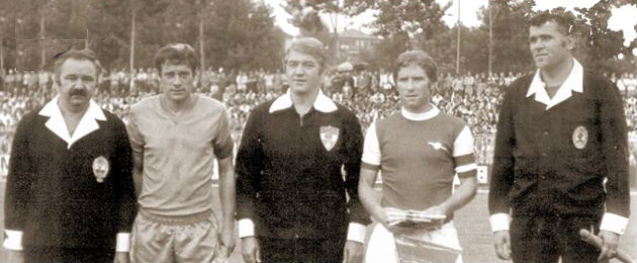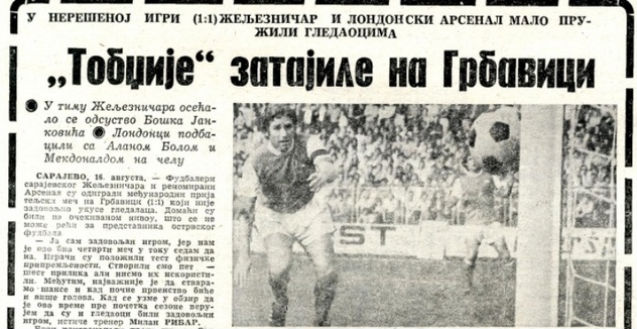I have been sent the following piece and translated it using Google – so some of the translation may be highly inaccurate. Indeed some of it turned out to be impossible to use.
But to see the original, click on the score line above.
Željezničar plays in Sarajevo; I imagine Boogaloo is the nickname of what is properly known as Fudbalski klub Željezničar – or just Željezničar as shown in Arsenal’s records. I have also been given the title “The Friendly Greens” which may be another version of the same nickname or another nickname.
Before the report is a bit of background…

The friendly greens and Arsenal played 1-1
On 16 August 1976 Arsenal played Fudbalski klub Željezničar of Yugoslavia in a friendly. This was just a few years after both club’s biggest triumph – Arsenal’s 1971 double of course, and Željezničar’s winning of the 1972 championship in Yugoslavia. They thus played in the 1973 European Cup but were knocked out in the first round by Derby.
At the time they were in a league dominated by Red Star Belgrade, Partizan Belgrade, Hajduk Split and Dinamo Zagreb, and apart from that one championship, their highest position was third on a couple of occasions.
Željezničar was originally the club of the railway workers, and is now in the Bosnian league and has gone on to be one of the two big clubs in Bosnia. It reached the third qualifying round of the Champions League in 2002 and was knocked out by Newcastle. However it did reach the Uefa Cup semi finals in 1985.
The game against Arsenal was played at the Grbavica Stadium which is known as the Valley of the Cups. It was when my Google translator turned this into Valley of the Pots that I began to realise some of the data coming through might not be accurate!
But here is the best I can make of the article…
Manager Milan Ribar was pleased commitment of the team. “We played four matches in seven days, and the players passed the test of physical fitness. Besides scoring one goal we created five or six of extraordinary chances, but were not been able to take advantage of. Nevertheless, it is important to create scoring opportunities.
“When you take into account that we are still in pre-season I believe that the crowd were satisfied with the game.”
Željezničar played with a lone striker Serbo, who without the help of teammates, was not able to make much headway and he scored in the first half leaving Rimmer with no chance. Arsenal equalised through MacDonald (the most expensive player in England).
Arsenal overall were disappointing and did not put on the display that the crowd in the Grbavica stadium had expected although everyone agreed that one of the best individual details were free passing between the Arsenal players.
The team as led by Alan Ball. Speaking after the match Arsenal players agreed that this was their pre-season and that their form was not yet at the desired and expected level.
After the game Šerbo said:
“It was a great match. Remember that the stadium was full, and I managed to score his first goal. Anyway remember with nostalgia this duel with Arsenal.”

If you can give me a more fulsome translation of the original (and I have had to cut quite a lot because I just can’t be sure I’ve got it right) I would be grateful.
But anyway – a record of a friendly that is otherwise just a note in the records.
- Woolwich Arsenal: The club that changed football – Arsenal’s early years
- Making the Arsenal – how the modern Arsenal was born in 1910
- The Crowd at Woolwich Arsenal


Here is a translation:
“In an even game (1:1) Željezničar and Arsenal didn’t offer much to the spectators”
The headline states: “Gunners misfire at Grbavica”
Then there are two important – according to journalist anyway – points below the headline: “Absence of Boško Janković was noticed * Londoneers led by Alan Ball and MacDonald fell short*
“FK Željezničar and the highly reputated Arsenal played an international friendly match that didn’t satisfy the taste of the spectators. The hosts were on the expected level but the same can’t be said for the representatives of the Island’s football.”
Then comes the part that was already translated:
“We played four matches in seven days, and the players passed the test of physical fitness. Besides scoring one goal we created five or six of extraordinary chances, but were not been able to take advantage of. Nevertheless, it is important to create scoring opportunities.
“When you take into account that we are still in pre-season I believe that the crowd were satisfied with the game.”
In the full article that dates from the newspapers Sport, 17th August 1976, the story goes on:
“Quick counter-attacks through Slobodan Kojović were the biggest threat for the Arsenal goalkeeper Rimmer. Although, absence of the goal-scorer Janković was visible. Lonely Šerbo without help from his team-mates couldn’t get a chance to give a final punch so a lot of useful balls went unused. The Željezničar defence was solid and dealt with the opponents’ strikers without problems. However, just like against Borac Banjaluka, one mistake of theirs was enough for goalkeeper Janjuš to concede.
Man of the match was Slobodan Kojović and it’s a real pity that Janković wasn’t on the pitch because there would have been more danger for the opponents and we would have seen more goals.
‘English football suits me and I’m happy with my form before the season starts’, Kojović said.
The Gunners from Highbury missfired. Long passes, high jumpings and precise shooting at Janjuš’s goal were missing from their game. Much more was expected from the most expensive player in England MacDonald – just like from the rest of the team led by Alan Ball.”
There was also a picture of two Željezničar players fighting for the ball with an Arsenal player but quality of the photo is very poor.
http://www.media.ba/sites/default/files/zeljo-arsenal.jpg
Džemal Šerbo was asked about the game. He told that he has nostalgic memories about the game. Not to nostalgic about the season that followed the game though – Željezničar were relegated in 1976-77.
Now, I don’t know where the whole story about “friendly greens” came from. Željezničar have been called “Plavi sa Grbavice” (Blues from Grbavica).
Speaking of this match, I don’t agree with the statement that it was just a friendly. For their 47th birthday, Željezničar (who have been the first club my palms were sweaty at the tender age of six) invited Santos led by that Brazilian striker who you might have heard of – his name was Pele. My father went to see that match against Santos for which Željezničar had a special reinforcement – Dragan Džajić, one of the best players in the history of Yugoslavia, played for Željezničar. The fact Željezničar invited Pele’s Santos, Italian Internazionale and Arsenal for their anniversaries says a lot about how big Arsenal Football Club have been outside England as well.
That 1985 semifinals against the Hungarian side Videoton remains as the biggest match in the history of Željezničar. Ivica Osim’s (a huge person and one of rare managers that rejected Real Madrid) exciting team lost 3:1 in the first leg but had a comfortable 2:0 lead in the second. In the last minutes of the game certain Csuhayi, a right full-back, did a Belletti – scored one of rare goals in his career but the one that denied Željezničar an opportunity to play UEFA Cup Final against Real Madrid.
Anyway, special thanks to Mr Attwood for making an article about this game.